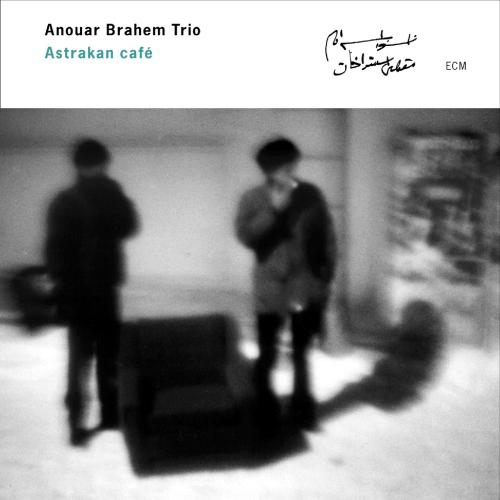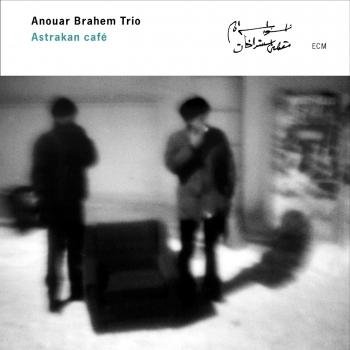
Astrakan Café Anouar Brahem Trio
Album Info
Album Veröffentlichung:
2000
HRA-Veröffentlichung:
12.08.2013
Das Album enthält Albumcover Booklet (PDF)
Entschuldigen Sie bitte!
Sehr geehrter HIGHRESAUDIO Besucher,
leider kann das Album zurzeit aufgrund von Länder- und Lizenzbeschränkungen nicht gekauft werden oder uns liegt der offizielle Veröffentlichungstermin für Ihr Land noch nicht vor. Wir aktualisieren unsere Veröffentlichungstermine ein- bis zweimal die Woche. Bitte schauen Sie ab und zu mal wieder rein.
Wir empfehlen Ihnen das Album auf Ihre Merkliste zu setzen.
Wir bedanken uns für Ihr Verständnis und Ihre Geduld.
Ihr, HIGHRESAUDIO
- 1 Aube rouge à Grozny 04:23
- 2 Astrakan Café (1) 03:19
- 3 The Mozdok's Train 04:47
- 4 Blue Jewels 07:24
- 5 Nihawend Lunga 03:32
- 6 Ashkabad 05:38
- 7 Halfaouine 05:58
- 8 Parfum de Gitane 07:05
- 9 Khotan 03:31
- 10 Karakoum 05:08
- 11 Astara 10:47
- 12 Dar es Salaam 03:48
- 13 Hijaz pechref 06:24
- 14 Astrakan Café (2) 04:49
Info zu Astrakan Café
Astrakan Café enthält neben neuen Kompositionen auch Bearbeitungen für das Trio aus Laute, Klarinette und Schlagzeug. So entsteht ein Portrait des Künstlers, das unterschiedliche Aspekte seiner kreativen Arbeit seit der zweiten Hälfte der achtziger Jahre zusammenfasst: beispielsweise die Titelmusik zu Ferid Boughedirs Film Halfaouine, der das Leben in dem gleichnamigen Arbeiterviertel von Tunis beschreibt, aus dem auch Brahem stammt; Parfum de gitane, das die untrennbare Verbindung zwischen der iberischen und der maghrebinischen Kultur thematisiert; Interpretationen einiger „Klassiker“ der arabisch-ottomanischen Tradition, die seit jeher im Zentrum seines Interesses stehen und mehr oder weniger deutlich als Paten einiger Stücke dieser Aufnahme erkennbar sind.
Sein Bedürfnis, aus der Tradition herauszutreten – für ihn die Summe erkennbarer klanglicher Erfahrungen und Gesten – und neue Grenzen zu erkunden, brachte ihn auch in Kontakt mit anderen Musikern, Interpreten von Musik verschiedener Epochen und Kulturen, von der Renaissance bis zum Flamenco, vom Jazz bis zur klassischen indischen Musik. Als der Dialog zwischen verschiedenen Musikbereichen noch nicht durch Eitelkeiten belastet war, suchte Brahem Begegnungen, die seine Fähigkeit zu Assimilation und Auseinandersetzung reifen ließen. Aus der tiefen Spannung zwischen den traditionellen Modellen und seinem Wunsch nach Innovation, die im übrigen auch die größten und berühmtesten Meister der Vergangenheit auszeichnet, entstanden Stücke, wie sie in Astrakan café zu hören sind.
Die Qualität dieser Aufnahme ist nicht zuletzt der ausgewogenen Akustik eines sakralen Ortes zu verdanken, der den Klang der drei Instrumente in vollkommener Weise wiedergibt. Brahems Laute lässt uns eine Welt entdecken, die, obgleich sie vertraut klingt, immer wieder fasziniert und mit neuen Details überrascht.
"Der Tunesier Lassad Hosni füllt mit Handtrommeln unaufdringlich das Aufnahmestudio - als solches wurde von Produzent und ECM-Chef Manfred Eicher das österreichische Kloster St. Gerold ausgewählt. In dieser Umgebung blüht die nordafrika- nische Kurzhalslaute Oud zu voller Klangschönheit auf und erlaubt dem tunesischen Virtuosen Anouar Brahem, dem Klang jeder einzelnen Saite nachzulauschen und die Gedanken wandern zu lassen. Wenn diese drei Musiker im ostarabischen Tonfall improvisieren, überzeugen sie weniger durch akrobatische Finessen als durch sanft hypnotisierende Melodien und Rhythmen." (W. Dulisch, stereoplay)
Anouar Brahem, oud
Barbaros Erköse, clarinet
Lassad Hosni, bendir, darbouka
Anouar Brahem
was born in 20 th October 1957 in Halfaouine in the Medina of Tunis. Encouraged by his father, an engraver and printer, but also a music lover, Brahem began his studies of the oud, the lute of Arab world, at the age of 10 at the Tunis National Conservatory of Music, where his principal teacher was the oud master Ali Sriti. An exeptional student, by the age of 15 Brahem was playing regularly with local orchestras. At 18 he decided to devote himself entirely to music. For four consecutive years Ali Sriti received him at home every day and continued to transmit to him the modes, subtleties and secrets of Arab classical music through the traditional master / disciple relationship.
Little by little Brahem began to broaden his field of listening to include other musical expressions, from around the Mediterranean and from Iran and India... then jazz began to command his attention. "I enjoyed the change of environment," he says" and discovered the close links that exist between all these musics".
Brahem increasingly distanced himself from an environment largely dominated by entertainment music. He wanted more than to perform at weddings or to join one of the many existing ensembles which he considered anachronistic and where the oud was usually no more than an accompanying instrument for singers. A deepfelt conviction led him to give first place to this preferred instrument of Arab music and to offer the Tunisian public instrumental and oud solo concerts. He began writing his own compositions and gave a series of solo concerts in various cultural venues. He also issued a self-produced cassette, on which he was accompanied by percussionist Lassaad Hosni.
A loyal public of connoisseurs gradually rallied around him and the Tunisian press gave enthusiastic support. Reviewing one of Brahem's first performances, critic Hatem Touil wrote: "this talented young player has succeed not only in overwhelming the audience but also in giving non -vocal music in Tunisia its claim to nobolity while at the same time restoring the fortunes of the lute. Indeed, has a lutist produced such pure sounds or concretised with such power and conviction, the universality of musical experience"
In 1981, the urge to seek new experiences became ever stronger and his departure for Paris, that most cosmopolitan of cities, enabled him to meet musicians from very different genres. He remained for four years, composing extensively, notably for Tunisian cinema and theatre. He collaborated with Maurice Béjart for his ballet "Thalassa Mare Nostrum" and with Gabriel Yared as lutist for Costa Gavras’ film "Hanna K.".
In 1985 he returned to Tunis and an invitation to perform at the Carthage festival provided him with the opportunity of bringing together, for "Liqua 85" , outstanding figures of Tunisian and Turkish music and French jazz. These included Abdelwaheb Berbech, the Erköse brothers, François Jeanneau, Jean-Paul Celea, François Couturier and others. The success of the project earned Brahem Tunisia's Grand National Prize for Music.
In 1987, he was appointed director of the Musical Ensemble of the City of Tunis (EMVT). Instead of keeping the large existing orchestra, he broke it up into formations of a variable size, giving it new orientations: one year in the direction of new creations and the next more towards traditional music. The main productions were "Leïlatou Tayer" (1988) and "El Hizam El Dhahbi" (1989) in line with his early instrumental works and following the main axis of his research. In these compositions, he remained essentially within the traditional modal space, although he transformed its references and upset its heirarchy. Following a natural disposition towards osmosis, which has absorbed the Mediterranean, African and Far-Eastern heritages, he also touched from time to time upon other musical expressions: European music, jazz and other forms.
With "Rabeb" (1989) and "Andalousiat" (1990), Anouar Brahem returned to classical Arab music. Despite the rich heritage transmitted by Ali Sriti and the fact that this music constitued the core of his training, he had in fact, never performed it in public. With this "return" he wished to contribute to the urgent rehabilitation of this music. He put together a small ensemble, a "takht", the original form of the traditional orchestra, where each instrumentalist plays as both a soloist and as an improviser. Brahem believes this is the only means of restoring the spirit, the subtlety of the variations and the intimacy of this chamber music. He called upon the best Tunisian musicians, such as Béchir Selmi and Taoufik Zghonda, and undertook thorough research work on ancient manuiscripts with strict care paid to transparency, nuances and details. For more information visit: http://www.anouarbrahem.com
Booklet für Astrakan Café











